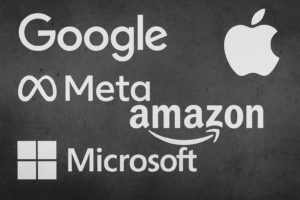Governments must act now to break the grip of Big Tech or risk handing over basic human rights to a handful of corporate giants, Amnesty International has warned in a hard-hitting new briefing.

The organisation says that the world’s most powerful tech firms – Google, Meta, Microsoft, Amazon and Apple – have become “digital landlords” controlling the infrastructure of our online lives, leaving billions of people vulnerable to abuses of privacy, discrimination and censorship.
In its new report, Breaking up with Big Tech, Amnesty accuses the so-called “big five” of building vast empires that now shape everything from how people search for information to how they shop, communicate, and even engage in democracy.
The briefing warns that this dominance is no longer simply a matter of market fairness but an urgent human rights issue.
“These few companies act as digital landlords who determine the shape and form of our online interaction,” said Hannah Storey, Amnesty’s Advocacy and Policy Adviser on Technology and Human Rights.
“Breaking up these tech oligarchies will help create an online environment that is fair and just.
“Failure to address Big Tech dominance can have serious consequences offline, as our investigations into Facebook’s role in the Tigray war in Ethiopia and the ethnic cleansing of the Rohingya in Myanmar have shown.”
The report outlines how Alphabet (Google), Meta (Facebook and Instagram), Microsoft, Amazon and Apple dominate search engines, social media, app stores, cloud computing and more, giving them extraordinary power to decide who has a voice online.
Amnesty says the risks are already clear, citing cases of inconsistent moderation, biased algorithms and content removal that have silenced marginalised communities and shaped political debate.
In many countries, daily life now depends on using these platforms – from accessing education and work to banking and communication – creating a situation where opting out is no longer realistic.
This, Amnesty argues, gives Big Tech a dangerous ability to control the flow of information and influence public opinion on a global scale.
Amnesty is calling on states to use competition law as a “human rights toolbox,” investigating anti-competitive practices and breaking up companies where monopoly power is shown to harm rights.
The organisation also urges governments to block mergers and acquisitions that would deepen corporate control, and to pay close attention to emerging technologies such as artificial intelligence before it is dominated by the same handful of players.
This is the first time Amnesty has published a briefing of this kind, underlining the urgency of the issue.
On August 12, Amnesty wrote to Google, Meta, Amazon, Microsoft and Apple with its findings. Meta and Microsoft responded, but Google, Amazon and Apple had not replied by the time of publication.
Amnesty says regulators must act before it is too late.
“The unchecked dominance of these companies poses one of the greatest threats to human rights in the digital age,” the briefing warns.
“Breaking up Big Tech is not just about competition – it’s about democracy, justice and human dignity.”